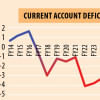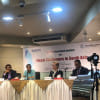Easing strain on reserves: Dhaka looks to secure $5.5b from IMF, WB

Bangladesh is hoping to get $5.5 billion from the International Monetary Fund and the World Bank as budget support, which will help the country shore up its depleting foreign currency reserves.
"We believe if we get the loans, our dollar crisis will be over," Bangladesh Bank Governor Abdur Rouf Talukder told reporters in Washington DC on Saturday after a series of meetings with officials of the two multilateral lenders.
Dhaka requested the lenders for the funds to better manage fiscal, monetary and financial stability risks amid the Russia-Ukraine war and also to tackle the climate challenges.
The BB governor said there had been discussions for securing loans of $4.5 billion from the IMF and $1 billion from the WB as budget support.
"As per our quota, we can take $7 billion from the IMF. But we plan to take $4.5 billion and have discussed it with the IMF officials," said Rouf.
He further said the loan has been sought from the IMF's Resilience and Sustainability Trust (RST) funds, created recently to help countries build resilience to external shocks and ensure sustainable growth.
"The IMF guidelines, however, stipulate that if you ask for loans from one of its components, you will have to take funds from its other components as well," he said, adding that Bangladesh also sought loans from the IMF's Extended Credit Facility (ECF) and Extended Fund Facility (EFF).
The BB governor said they also had talks with the WB to get $1 billion loan -- $250 million from the Development Policy Credit (DPC) and $750 million from the global lender's Green, Resilient Inclusive Development (GRID) fund -- as budget support.
He said the advantage of a budge support fund is that it's easier to get. "That's why we preferred this fund."
About the country's balance of payments (BoP), the governor said the pressure on the current account balance eased over the last three months, as the remittance and export earnings combined were equal to the import bills during the period.
According to Investopedia, the current account balance is part of a country's financial inflow and outflow record. It's part of the BoP, the statement of all transactions made between one country and another.
Rouf said the pressure on the current account balancewould ease further once the payments of the outstanding LCs (letters of credit) are made.
"I think the strain on the foreign currency reserves would not be there after November-December, provided that the economy doesn't suffer any further global shock," he said.
Bangladesh's forex reserve came under severe strain since the start of the Russia-Ukraine war in February, as the import bill galloped due to price hike of commodities, especially food, fuel and fertiliser, in the international market.
As of October 12, the reserve stood at $36.33 billion compared to $41.82 billion on June 30 this year. It was $46.13 billion on October 12 last year, according to BB data.
At a press conference in Washington DC on Friday, Anne-Marie Gulde-Wolf, deputy director of the Asia and Pacific Department of the IMF, said they would send a team to Bangladesh next week to discuss the country's loan request.
"We also have seen the taka depreciate by about 20 percent. The reserves have gone down," she said, adding that the reserves were still at a comfortable level but had been on a downward trend.
"So, with this, we are pleased that the authorities have been proactive in engaging with the IMF in discussing an economic programme that will contain measures to stabilise the economy and to avoid a further downturn in the economy," she noted.
Seeking anonymity, a finance ministry official told The Daily Star yesterday that an IMF delegation will arrive in Dhaka on October 26.

 For all latest news, follow The Daily Star's Google News channel.
For all latest news, follow The Daily Star's Google News channel. 









Comments